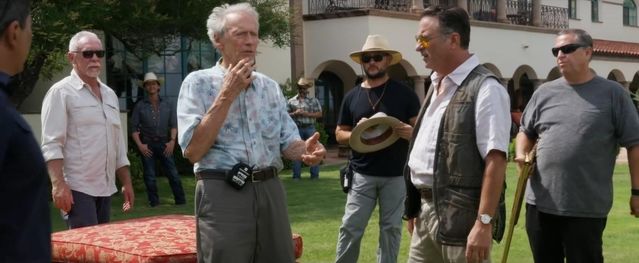Career
"The Mule": A Film Review
Clint Eastwood directed, produced, and starred in this moral tale.
Posted April 17, 2019

Clint Eastwood is 89 years old. He sure looks like an old man in this film when he unsparingly dresses himself in shabby clothes hanging off his thin frame and hides none of the sinews in his arms or the lines in his face. But be not fooled: Eastwood’s mind and spirit are eminently forceful, his acting is as convincing as ever, and he has mastered the art of directing, proving so yet again with The Mule. He is a living testament to growing old well.
The Mule is a story about family, and ultimately its unparalleled value. The script was “inspired” by a NY Times Magazine article titled "The Sinaloa Cartel's 90-Year Old Drug Mule," written by Nick Schenk, who also wrote the screenplay with Sam Dolnick.
Earl Stone (Eastwood) served in the Korean War. He portrays a resolute, duty-bound character, inculcated by service, in his case by military service. After mustering out, he had a career as a horticulturalist, creating the all-so-transient beauty of the flowers he grew, for which he won lots of awards. But his singular attention to his floral life eclipsed his family, who then had nothing to do with him for many years. He also made very little money, which might have been used to help support them, no less keep him from being foreclosed out of his humble home and dilapidated greenhouse.
Earl’s story reminded me of Walter White's dilemma (Breaking Bad). That amazing series began its narrative by placing White in circumstances that were truly awful, out of his control, and aggravated by the hateful medical insurance industry. What’s a guy to do? Well, he is a chemist and desperately needs money. So he cooks crystal meth. We sympathize with him because his are situational ethics, those that derive from the inescapable, over-heated steam that reality can sometimes produce. Later, the Breaking Bad narrative changes to power, but that’s another matter.
Earl is homeless, cast aside by his family. But he is presented with very worthy causes: the VFW post having to close because they have no money to rebuild after a kitchen fire, the local ice rink is falling apart, and other good Samaritan community contributions. Then his granddaughter needs help for school. His opportunity to do good strikes when he is approached at a party by an enterprising young Mexican. While Earl is no chemist, he has a totally unmemorable truck, an unblemished driving record (never a ticket!) — and needs work.

Soon, Earl calls the phone number the man has provided. He winds up in a garage with several Mexican men with automatic rifles and lots of tattoos. They drop a satchel into the load bed of his truck. He is told to drive to a location, answer the phone he is given day and night, and leave the truck for an hour with the keys in the glove compartment. They tell him that when he returns, the glove compartment will not only have his keys but a bundle of money. So begins his new career as a “mule” (drug carrier) for the cartel. Over time, he does a dozen or more runs, becomes a rich man, and continues to give away his money for good and family causes, though he does buy himself a fine, new truck after the old one quits on him.
But the DEA knows cocaine traffic has grown huge. The agents need to prove their mettle and show results, namely busts to sustain their big budget. The vise tightens on both the hunter and the hunters. Yet both Earl and the cartel defy capture. Until… Earl, ironically, places family first, for the first time, which pulls him from his routine. The DEA finally scores. Earl has at last done right (not in smuggling but with family) and doing so gets him caught.
The Mule has an A-list cast: Bradley Cooper, Michael Peña and Laurence Fishburne are DEA agents. They are having fun being cops with Earl as the would-be robber. Andy Garcia plays the Mexican cartel boss, always a dangerous occupation. And Dianne Wiest elegantly portrays Mary Stone, Earl’s estranged wife.
Pathos fills the storyline as the film winds down. We watch a wonderfully sentimental Earl, embodied and directed to be that way by Eastwood, especially so with his dying wife, his daughter, and granddaughter. Moreover, the moral tale he conveys is clearly no ‘hard-liner’, no way tough on crime, when it comes to the justice delivered from transporting thousands of kilos of cocaine. Instead, Earl’s fate is restitutive and redemptive — as he again tends flowers in his ‘retirement’ home, a federal prison. I wonder what Dirty Harry would have thought of that outcome? Not sure it would have ‘made his day’. Go figure.


